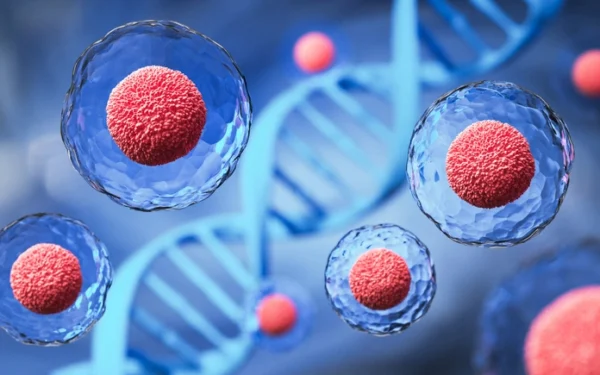Introduction to Precision Cancer Testing
The landscape of cancer research and personalized medicine has undergone a compelling transformation with the advent of Next-Generation Sequencing (NGS). This groundbreaking technology has revolutionized our understanding of the molecular basis of cancer. NGS has emerged as a powerful tool for dissecting the complexities of cancer genomes, allowing researchers to uncover novel mutations, structural alterations, and gene expression patterns that drive tumorigenesis and disease progression. In this blog, we delve into the profound impact of NGS on cancer research, exploring its applications in genetic testing and its far-reaching implications for cancer screening, diagnosis, prognosis, and treatment via personalized medicine. From elucidating the genetic drivers of cancer to guiding personalized therapeutic approaches, NGS has fundamentally reshaped our strategies for combating this formidable disease, offering new avenues for precision medicine and targeted therapies tailored to the unique molecular profiles of individual tumors.
Understanding Cancer Genetics
Cancer, a complex and multifactorial disease characterized by uncontrolled cell division and DNA changes, is influenced by various genetic and environmental factors. While significant efforts have been devoted to comprehending the environmental triggers of cancer, unraveling its genetic foundations is essential to grasp its molecular intricacies fully. This comprehensive understanding of cancer genetics has advanced our knowledge and paved the way for developing targeted therapeutics, advanced screening techniques, and innovative treatment modalities, heralding a new era in cancer research.
The study of cancer genetics has undergone a remarkable evolution over the past century, marked by significant milestones that have deepened our understanding of the genetic basis of cancer. The journey began in the early 20th century when researchers first recognized the hereditary component of certain cancers, such as retinoblastoma and familial breast cancer. In the 1970s, researchers like Harold Varmus and J. Michael Bishop discovered oncogenes, which provided pivotal insights into the molecular mechanisms driving cancer development. These discoveries laid the groundwork for understanding how genetic mutations can disrupt normal cellular processes, leading to uncontrolled growth and tumor formation.
The late 20th century witnessed a surge in technological advancements that revolutionized the field of cancer genetics. The advent of DNA sequencing techniques, such as Sanger sequencing, enabled researchers to identify specific genetic mutations associated with various cancer types. This era also saw the discovery of tumor suppressor genes like TP53 and BRCA1, further revealing the genetic underpinnings of cancer susceptibility. Additionally, the development of molecular tools like polymerase chain reaction (PCR) facilitated the detection of genetic alterations with higher sensitivity, paving the way for personalized cancer diagnostics and targeted therapies.
In the 21st century, the study of cancer genetics has entered the era of high-throughput sequencing technologies. Although it has mainly been supplanted by Next-Generation Sequencing (NGS) technologies due to its relatively low throughput and labor-intensive nature, Sanger sequencing remains valuable for sequencing individual DNA fragments and validating NGS results. In comparison, Next-Generation Sequencing (NGS) is a high-throughput DNA sequencing technology that has revolutionized genomics research. By parallelizing the sequencing process, NGS enables the rapid generation of massive amounts of sequencing data, allowing for comprehensive analysis of entire genomes, transcriptomes, and beyond.
These cutting-edge platforms have enabled researchers to analyze the entire cancer genome in unprecedented detail, uncovering many somatic mutations, copy number alterations, and structural variations implicated in tumorigenesis. Furthermore, advances in bioinformatics and computational biology have empowered researchers to interpret large-scale genomic data sets, leading to the discovery of novel cancer driver genes and pathways. This integration of genomics into cancer research has fueled the development of precision oncology approaches, aiming to tailor treatments based on the unique genetic profile of individual tumors, ultimately ushering in a new era of targeted and personalized cancer therapy.
NGS in Cancer Research
Mutations in genes often drive the development of cancer, and NGS has emerged as a cornerstone in cancer research by enabling the identification of gene alterations responsible for cancer initiation and progression. With over 200 different types of cancer, NGS plays a pivotal role in distinguishing between inherited and acquired mutations, shedding light on the intricate pathways involved in cancer development. This technology provides a comprehensive view of the genetic landscape, opening new avenues for targeted therapies and precision medicine. Key areas where NGS has propelled cancer research include:
- Genomic Profiling: The meticulous identification of mutations associated with various cancers and the in-depth characterization of tumor genomes, unraveling the genetic intricacies of each cancer type.
- Cancer Biomarker Discovery: Uncovering mutations as predictive biomarkers for cancer risk and identifying microRNA signatures specific to different cancer subtypes enhances our ability to detect and predict the course of the disease.
- Personalized Medicines: Tailoring immunotherapies based on individual tumor mutations, ushering in an era of personalized treatment that considers the unique genetic makeup of each patient.
- Liquid Biopsies: Detecting and monitoring diseases using circulating tumor DNA (ctDNA) and minimal residual disease from blood samples, providing a non-invasive and real-time approach to cancer monitoring.
- Pharmacogenomics: Identifying genetic variations that influence responses to chemotherapy drugs, optimizing treatment plans, and minimizing adverse effects.
- Functional Genomics: Utilizing CRISPR-based knockouts to identify genes essential for specific cancer cell behaviors and analyzing transcriptomes to understand changes in gene expression, unraveling the functional aspects of cancer genetics.
- Epigenomics: Profiling DNA methylation patterns to reveal epigenetic changes associated with cancer progression, contributing to a more comprehensive understanding of cancer development.
- RNA Sequencing: Identifying fusion genes in certain cancers and profiling gene expression changes in response to targeted sequencing, providing insights into the dynamic nature of cancer cells.
- Microbiome Analysis: Investigating the link between the oral microbiome and the risk of developing specific cancers, exploring the intricate interplay between the microbiome and cancer development.
One notable study utilizing NGS technology involved the Cancer Genome Atlas (TCGA) project, a collaborative effort to characterize genomic alterations across various cancer types. Utilizing NGS, TCGA generated comprehensive molecular profiles of over 11,000 tumor samples, providing unprecedented insights into cancer’s genomic heterogeneity and complexity. This landmark study identified recurrent mutations, copy number alterations, and structural variations associated with specific cancer types, facilitating the identification of novel therapeutic targets and the development of precision medicine approaches tailored to individual patients.
Also, NGS has revolutionized our understanding of tumor evolution and intra-tumor heterogeneity, shedding light on the dynamic nature of cancer and its adaptation to therapeutic pressures. A groundbreaking study by Gerlinger et al. utilized NGS to analyze multiple regions of primary and metastatic tumors from patients with renal cell carcinoma, uncovering extensive intratumor heterogeneity and clonal evolution within individual tumors. By tracking the evolutionary trajectories of cancer cells, this study revealed how tumors acquire resistance to therapy and highlighted the importance of targeting multiple clones to prevent treatment resistance. These findings underscore the power of NGS in exposing the complex dynamics of tumor evolution, informing treatment strategies, and advancing precision oncology.
Clinical Applications of NGS in Oncology
NGS techniques have become indispensable in clinical oncology, particularly in interpreting the genetic basis of various cancer types. By uncovering underlying genetic mutations, NGS enables a more precise therapeutic approach, advancing the field of personalized precision medicine cancer testing. Moreover, NGS holds the potential to identify pharmacogenetic markers, paving the way for targeted and individualized cancer therapies that consider each patient’s genetic makeup.
Notable examples include using NGS to identify actionable genetic alterations for targeted therapy selection. For instance, in non-small cell lung cancer (NSCLC), NGS-based profiling has been instrumental in detecting driver mutations such as EGFR, ALK, ROS1, and BRAF, guiding the selection of targeted therapies such as tyrosine kinase inhibitors (TKIs). This approach has significantly improved response rates and survival outcomes compared to conventional chemotherapy, illustrating the transformative impact of NGS in personalized cancer treatment.
Additionally, NGS has facilitated the implementation of liquid biopsy assays for non-invasive monitoring of tumor dynamics and treatment response. Liquid biopsies, which analyze circulating tumor DNA (ctDNA) shed into the bloodstream, offer a minimally invasive alternative to traditional tissue biopsies and enable real-time monitoring of tumor evolution and resistance mechanisms. In clinical practice, NGS-based liquid biopsy assays have been utilized to detect relapse early, assess minimal residual disease, and identify emerging resistance mutations in patients undergoing targeted therapy or immunotherapy. These applications highlight the clinical utility of NGS in monitoring treatment response, guiding therapeutic adjustments, and improving patient management in oncology settings.
Personalized Medicine Cancer Testing and Next-Generation Sequencing
Next-Generation Sequencing (NGS) has emerged as a cornerstone of personalized medicine, offering unprecedented insights into individual genetic variations that influence disease susceptibility, treatment response, and prognosis. By enabling comprehensive genomic profiling at high throughput and reduced cost, NGS facilitates the identification of genetic alterations associated with various diseases, including cancer, cardiovascular disorders, and rare genetic conditions. This wealth of genomic information allows clinicians to tailor treatment strategies based on the unique genetic makeup of each patient, optimizing therapeutic outcomes and minimizing adverse effects. Likewise, NGS plays a crucial role in pharmacogenomics, identifying genetic variants that influence drug metabolism and response, and guiding the selection of optimal medications and dosages for individual patients.
Numerous studies have demonstrated the clinical utility of NGS in personalized medicine across diverse medical specialties. In oncology, NGS-based genomic profiling has enabled the identification of actionable mutations and molecular subtypes, guiding the selection of targeted therapies and immunotherapies tailored to individual patients’ tumor profiles. Additionally, NGS has facilitated the implementation of liquid biopsy assays for non-invasive monitoring of tumor dynamics and treatment response, offering a real-time approach to cancer management. These examples underscore the transformative impact of NGS on personalized medicine, paving the way for more precise and effective healthcare interventions tailored to each patient’s genetic predispositions and clinical characteristics. [Reference: Jamal et al. (2013). The impact of NGS technologies on personalized medicine. Personalized Medicine, 10(5), 425-437.]
Conclusion
The introduction of Next-Generation Sequencing (NGS) has transformed cancer research and fundamentally reshaped our cancer management and therapeutics strategies. By researching the profound impact of NGS on cancer research, we have meticulously explored its applications in genetic testing and its far-reaching implications for cancer screening and treatment. This transformative technology has provided researchers with unparalleled insights into the genetic landscape of cancer, enabling the identification of essential genetic alterations driving tumorigenesis and disease progression. As we continue to unravel the complexities of cancer genetics using NGS, we are witnessing a paradigm shift towards personalized precision medicine approaches that consider the unique genetic makeup of individual tumors, ultimately offering new hope for patients and clinicians alike.
Likewise, NGS has facilitated groundbreaking advancements in clinical oncology and personalized medicine, empowering clinicians with powerful tools for diagnosing, monitoring, and treating cancer with unprecedented precision. We have witnessed how NGS has transformed our understanding of cancer biology and therapeutic resistance mechanisms through notable examples such as the Cancer Genome Atlas (TCGA) project and studies on tumor evolution and intra-tumor heterogeneity. Furthermore, the clinical applications of NGS in oncology, including identifying actionable genetic alterations for targeted therapy selection and implementing liquid biopsy assays for real-time treatment response monitoring, highlight this technology’s transformative potential in improving patient outcomes and guiding personalized treatment strategies. As we look towards the future, the continued evolution of NGS promises to redefine the landscape of cancer research and clinical practice, offering new avenues for innovation and discovery in the fight against cancer.
How Sapio Sciences Can Help?
Sapio Sciences is a pioneering company at the forefront of Next-Generation Sequencing (NGS) testing, offering innovative solutions that empower researchers and clinicians to decipher the complexities of the human genome. Leveraging cutting-edge technology and advanced bioinformatics tools, Sapio Sciences provides comprehensive NGS testing services tailored to meet the diverse needs of the scientific community. Our expertise spans genomic profiling, cancer biomarker discovery, personalized medicine, and functional genomics, enabling precise and targeted analysis of genetic variations associated with disease susceptibility, treatment response, and prognosis. With a commitment to excellence and a dedication to driving scientific progress, Sapio Sciences plays a pivotal role in cancer research and advancing the field of precision medicine through NGS testing.
Frequently Asked Questions
**Q1: What is Next-Generation Sequencing (NGS), and how has it impacted cancer research?**
**A1:** Next-Generation Sequencing (NGS) is a cutting-edge DNA sequencing technology that has revolutionized our understanding of cancer at the molecular level. By enabling researchers to analyze the entire cancer genome in unprecedented detail, NGS has facilitated the identification of novel mutations, structural alterations, and gene expression patterns driving tumorigenesis and disease progression.
**Q2: How does NGS contribute to personalized medicine in cancer testing and treatment?**
**A2:** NGS plays a crucial role in personalized medicine by providing clinicians with insights into individual genetic variations that influence disease susceptibility, treatment response, and prognosis. Through comprehensive genomic profiling, NGS enables the identification of genetic alterations associated with cancer, guiding the selection of targeted therapies tailored to each patient’s unique tumor profile.
**Q3: What are some critical applications of NGS in cancer research and clinical oncology?**
**A3:** NGS has propelled cancer research and clinical oncology in various ways, including genomic profiling, cancer biomarker discovery, personalized medicine, liquid biopsies for real-time monitoring, pharmacogenomics, functional genomics, epigenomics, RNA sequencing, and microbiome analysis. These applications have led to significant advancements in understanding tumor biology, identifying therapeutic targets, and monitoring treatment response.
**Q4: Can you provide examples of landmark studies utilizing NGS technology in cancer research?**
**A4:** One notable example is the Cancer Genome Atlas (TCGA) project, which utilized NGS to characterize genomic alterations across various cancer types, providing unprecedented insights into cancer heterogeneity and complexity. Additionally, studies on tumor evolution and intra-tumor heterogeneity, such as those by Gerlinger et al., have highlighted the dynamic nature of cancer and its adaptation to therapy, thanks to NGS technology.
**Q5: How has NGS transformed the landscape of cancer management and therapeutics?**
**A5:** NGS has fundamentally reshaped cancer management and therapeutics by enabling personalized precision medicine approaches tailored to each patient’s genetic makeup. Through identifying actionable genetic alterations and implementing liquid biopsy assays for real-time monitoring, NGS has improved treatment outcomes, minimized adverse effects, and offered new avenues for innovation in the fight against cancer.
External Resources
1. American Association for Cancer Research (AACR) – Next-Generation Sequencing: The American Association for Cancer Research offers valuable resources and insights into the role of Next-Generation Sequencing (NGS) in advancing cancer research and personalized medicine. Their website provides access to research articles, conference proceedings, and educational materials related to NGS technologies and their impact on cancer diagnosis, treatment, and prognosis.
2. National Human Genome Research Institute (NHGRI) – Cancer Genomics: The National Human Genome Research Institute features a dedicated section on cancer genomics, highlighting the latest advancements in genomic sequencing technologies and their applications in cancer research and clinical practice. This resource provides insights into cancer genome sequencing projects, data analysis tools, and collaborative initiatives aimed at unraveling the genetic basis of cancer and developing targeted therapies.





